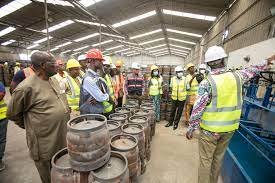Cylinder Recirculation Model must work
Abtvgh / Recycle Model Work
Last week, the National Petroleum Authority (NPA) announced the commencement of the implementation of the Cylinder Recirculation Model (CRM).

Under the model, residents of Accra and Kumasi will exchange empty cylinders for already filled ones at cylinder exchange points in the two regions after they have registered with their national identification cards or any other form of identification.
The policy is to increase uptake of Liquified Petroleum Gas (LPG) by at least 50 per cent to consumers by 2030 and improve safety in the distribution value chain.
Already, the CRM has been piloted in some areas in the Eastern, Ashanti and Northern regions, and the NPA has given an assurance that the lessons learnt during the pilot have shaped the phased implementation, which begins next month.
In October 2017, a large-scale gas explosion occurred at Atomic Junction at Madina, Accra, when an offloading LPG tanker Bulk Road Vehicle (BRV) caught fire.
The incident further strengthened the arguments for a new model that is safer and more efficient.
The CRM idea started in 2013 under the LPG for Development Programme under the auspices of the Ministry of Energy.
The 2017 explosion ignited a further discussion on policy options and implementation at the time.
Operators of gas filling stations kicked vehemently against the policy.
The Cabinet has since approved it and directed the NPA through the Ministry of Energy to implement it.
Although the Daily Graphic welcomes the introduction of the CRM, there have been genuine concerns expressed by citizens since the announcement.
These, we believe, will be addressed through consultation and dialogue during implementation.
According to the NPA, a lot of consultation has happened and is still ongoing.
It has been several years of policy making, preparation and now time for implementation.
Four bottling plants are ready and rollout is certain.
One of the main concerns raised over the new policy is that it will lead to job losses.
However, the NPA has assured the public that there would be no job losses; in fact the increased volumes of LPG consumption will create more jobs for dealers and resellers in every nook and cranny of the country in the quest to bring LPG to the doorstep of the consumer.
The announcement outlines that the distribution systems will operate side by side with phase-out happening over a period.
Another concern is whether the existing system will be shut down outrightly.
Under the new policy, LPG outlets will operate as either Exchange Points or Auto Gas Outlets.
Existing outlets will continue to operate over time and transition to one of the aforementioned based on their delivery volumes for either domestic or vehicular demand.
They will also be accessed based on risk factors and health and safety standards based on their location.
The Daily Graphic is of the view that there must be opportunities to retrain those who work in the existing value chain of these filling stations for their absorption into the CRM processes such as the bottling plants or distribution chains, especially in new opportunities under the CRM, such as health and safety training and monitoring of the value chain.
The Daily Graphic is happy to note that the concerns of users of LPG as to whether they could buy any quantity of the product they could afford, and exchange of their cylinders have been addressed.
Those who own cylinders will exchange them for new ones from bottling plants and these will come in a variety from 3kg, 6kg, 14.5kg, 15kg and so on.
Cylinders will be maintained and monitored at every opportunity when they go back to the bottling plants to be refilled.
They will either pass the test, be rejected for refurbishment or scrapped.
This gives the consumer protection from leaky and damaged cylinders.
The various sizes of cylinders provide the consumer a variety to choose from depending on affordability.
The Daily Graphic notes that the price of gas will not be affected under the policy, with the likelihood of standard prices across the board under the CRM.
That is good news.
The NPA has also promised continued consultation and public education to engage better on the policy and come out with full information as the rollout begins, particularly on the report of the pilot, lessons learnt and how they could be incorporated into the phased-out implementation to start next month.
The Daily Graphic expects collaboration and further engagement between the NPA and its key stakeholders to ensure a successful rollout.
It is also important for the NPA to clarify other concerns raised since the announcement.
Although gas explosions have necessitated a more stringent regulation, the problem still occurs in homes.
And we think the introduction of new cylinders and maintenance of same will go a long way to sanitise the sector and safeguard households.
But we urge the NPA to expand its sensitisation, especially in communities with information on safety in the use of gas.
We all need assurances from the NPA to make the CRM a success.



